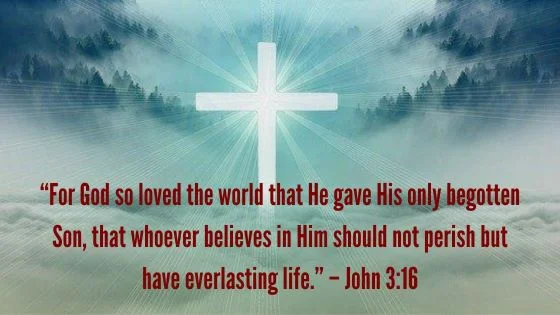
Note: This post was updated on May 4, 2025, with expanded apologetic sections and a revised introduction to reflect recent conversations in my workplace.
A few years ago, I found myself deep in conversation with two of my colleagues at a private hospital in Saudi Arabia where I work as a medical laboratory scientist.
One of them, a devout Muslim from India, looked me straight in the eye and said, “Islam is the true religion. You’ve been deceived into believing that Jesus is God.” Her words weren’t shouted—they were calm, confident, and deeply personal.
Another colleague, a Catholic, chimed in with a very different take: “But we worship the same God, don’t we? Christians and Muslims—same God, different paths.”
That moment left a mark. Here we were, professionals from different countries and backgrounds, gathered around a breakroom table, grappling with one of the most profound theological questions of our time.
I realized quickly that this wasn’t just an abstract debate or a matter for scholars—it was a question that shaped our identities, our relationships, and our eternal hopes.
Having walked with Jesus for over two decades, I knew I had to wrestle deeply and biblically with the question: Do Christians and Muslims really worship the same God?
Why This Question Matters More Than Ever
In an age of global connections, interfaith dialogue is both commonplace and crucial. You might meet a Muslim neighbor at your son’s soccer game, or sit beside a Muslim colleague during a company retreat. We long for unity and harmony, and rightly so.
Yet genuine dialogue demands clarity. If two faiths point to the same God, our conversations become bridges; if they point to different Gods, our approach must be rooted in truth and love.
For the Christian, understanding who God is at His core informs every facet of life: worship, ethics, mission, and community. When Christians grasp that the God of Scripture is unique, they can more confidently share the Gospel with grace and humility. And when Muslims seek answers, they deserve an honest, heartfelt response that honors both their questions and God’s revelation.
? Key takeaway: This question shapes how we pray, how we witness, and how we live out the call to love our neighbors (Matthew 22:37–39).
God’s Character: Relational Love vs. Transcendent Majesty

1️⃣ The God Who Walks With Us
From the first pages of Scripture, Yahweh displays a heart that pursues relationship. In Genesis 3:8 (NIV), after Adam and Eve sin, we read, “They heard the sound of the Lord God walking in the garden in the cool of the day.”
Imagine that: our Creator strolling in a garden just to be near His beloved creation.
Throughout Israel’s history, God enters covenants not as an aloof monarch but as a covenant partner. He speaks intimately to Abraham (Genesis 12:1–3), mourns with David (Psalm 6:6–7), and promises comfort through the prophets (Isaiah 40:1–2). Ultimately, God’s love peaks in sending His Son:
“For God so loved the world that he gave his one and only Son…” —John 3:16 (NIV)
Here, divine love is not abstract; it is incarnate.
2️⃣ A Majestic God Who Remains Distant?
Islam affirms attributes like “Ar-Raḥmān” (The Most Merciful) and “Al-Wadūd” (The Loving One) among Allah’s 99 names. Yet the Quran repeatedly underscores divine transcendence: “There is nothing like unto Him” (Quran 42:11, Sahih International).
This emphasis on Arabic terms such as “khāfiḍ” (to abase) and “yamliku” (to own utterly) paints a picture of an omnipotent ruler whose affection, while present, feels secondary to His majesty.
A striking example is the repeated statement:
“And [the disbelievers] plotted, and Allah planned. And Allah is the best of planners.” —Quran 3:54 (Pickthall)
Scholars debate whether the term implies a righteous plan or divine deception. Either way, the tone suggests a God whose interactions are driven by inscrutable counsel rather than a warm embrace. For many Muslims, this can lead to reverent fear more than heartfelt intimacy.
Scripture reflection: In contrast, the Bible invites us to call God “Abba, Father” (Mark 14:36)—a term of tender belonging.
Absolute Truthfulness vs. Divine Deception
1️⃣ A God Whose Word Never Shifts
Christianity rests on the bedrock that God’s character is unchanging. Paul writes:
“…in hope of eternal life, which God, who does not lie, promised before the ages began.” —Titus 1:2 (ESV)
And Hebrews echoes:
“It is impossible for God to lie.” —Hebrews 6:18 (NIV)
From Abraham’s promised heir (Genesis 17:16–19) to the resurrection of Christ (Acts 2:31–35), every promise stands firm. This unshakeable trust empowers believers to face trials, knowing God will fulfill His word (2 Peter 3:9).
2️⃣ Can Divine Deception Be Justified?
The Quranic phrasing in verses like 8:30 and 10:21 uses words translated as “plan” or “deceive.” If divine deception is part of God’s toolkit, then certainty before Him becomes elusive. As one Muslim apologist put it, “How can I know where I stand until the final scales tilt on Judgment Day?”
In Christianity, assurance is central: “My sheep hear my voice…and no one will snatch them out of my hand” (John 10:27–28). We don’t approach God hoping our good outweighs our bad; we rest in Christ’s finished work (Romans 8:1).
Trinity vs. Strict Unitarianism
1️⃣ Three Persons, One Essence
The mystery of the Trinity can feel daunting, but it flows naturally from the Bible’s narrative:
- Old Testament hints: Genesis 1:26 (“Let us make man in our image”), Isaiah 48:16 (Speaker, Spirit, and sent One).
- New Testament clarity: Matthew 28:19 (baptizing in Father, Son, Spirit), 2 Corinthians 13:14 (grace of Jesus, love of God, fellowship of Spirit).
Jesus Himself claimed deity: “I and the Father are one” (John 10:30), and the apostles worshipped Him (Hebrews 1:8). The Trinity reveals a God of community and perfect love, eternally interdependent.
2️⃣ The Shahada and Single-Person Monotheism
Islam’s central creed—“There is no god but Allah, and Muhammad is His messenger” — Shahada — “asserts an uncompromising unity. The Quran states emphatically: “He neither begets nor is born” (Quran 112:3).
Jesus, in Islam, is honored as a prophet but never divine (Quran 5:72–74). To suggest a plurality in God’s nature is labeled the gravest of sins (Shirk).
This difference is not minor. One view sees the Father giving the Son glory (John 17:1), and the other forbids any co-equal personhood.
Here’s a video of a former Muslim, turned Christian, explaining the Trinity.
Real-Life Implications for Faith and Practice
1️⃣ Prayer
Do we approach God as a beloved Father (Romans 8:15) or as an intimidating sovereign we can never truly know?
2️⃣ Assurance of Salvation
Are we anchored in Christ’s righteousness (Philippians 3:9), or striving to earn favor through uncertain rites?
3️⃣ Interfaith Dialogue
Clarity on God’s nature empowers us to engage with compassion and truth, avoiding syncretism or superficial harmony.
“When the Son sets you free, you are free indeed.” —Jesus, in John 8:36 (NLT)
Honest Responses to Common Questions

1️⃣ Didn’t Abraham worship the same God?
It’s true that both Christians and Muslims trace spiritual ancestry to Abraham. However, the similarity in origin does not imply identity in doctrine. Scripture teaches that Abraham’s faith was ultimately fulfilled in the promise of Christ.
In Galatians 3:8, Paul writes, “Scripture foresaw that God would justify the Gentiles by faith, and announced the gospel in advance to Abraham: ‘All nations will be blessed through you.’”
This blessing culminates in Jesus, the seed through whom the nations are blessed (Galatians 3:16).
In contrast, Islam reveres Abraham (Ibrāhīm) as a prophet who submitted perfectly to Allah (Quran 2:131), but it denies the fulfillment of God’s covenant in Christ.
The Christian understanding of Abraham’s God includes a Trinitarian fulfillment that Islam fundamentally rejects. Therefore, while the name may be shared, the identity of the God being worshipped diverges significantly in content and purpose.
2️⃣ Is the Bible corrupted?
Many Muslims believe that the Bible has been altered and cannot be trusted, citing discrepancies or translation differences. However, historical and textual evidence strongly supports the Bible’s reliability.
With over 5,800 Greek New Testament manuscripts, some dating within a few decades of the original writings, scholars can reconstruct the biblical text with over 99% accuracy. The Dead Sea Scrolls, dating as far back as 250 BC, show that the Old Testament has been faithfully preserved over millennia.
Jesus Himself affirmed the authority and truthfulness of Scripture (John 17:17), saying, “Heaven and earth will pass away, but my words will never pass away” (Matthew 24:35). If Jesus is trustworthy, then so is the Bible that testifies about Him.
Islam, on the other hand, teaches that the Torah and the Gospel were originally revealed by Allah but later corrupted (Quran 2:75–79). Yet the Quran also encourages people to judge by what God has revealed in the Gospel (Quran 5:47).
This poses a contradiction: how can the Quran instruct reliance on a supposedly corrupted text? The more consistent and historically grounded view is that the Bible remains trustworthy and that challenges to its authenticity are often based on later theological presuppositions, not on evidence.
3️⃣ Can’t we just agree to disagree?
While we should always approach others with love and humility (1 Peter 3:15), truth matters—especially when it concerns eternal destiny. Jesus didn’t claim to be a prophet pointing to the way; He claimed to be “the way, the truth, and the life. No one comes to the Father except through me” (John 14:6).
This is not a negotiable or peripheral claim—it is a direct contradiction to any system that denies His divinity or mediating role.
Respect does not require theological compromise. True love speaks truth graciously but unflinchingly. To say that Jesus is merely one of many paths is to contradict His own testimony and diminish His glory.
? Key thought: Apologetics is not about winning debates—it’s about faithfully pointing people to the living God, revealed fully in Jesus Christ.
Let’s not shy away from the hard questions. They are doorways to deeper faith and clearer witness.
A Heartfelt Invitation
I understand that wrestling with these truths can be both challenging and humbling, especially when you deeply care for Muslim friends or family. Please know: this exploration is not about winning an argument; it’s about encountering the One who loved us to the point of sacrifice.
- Explore God’s Word: Spend time reading through the Gospel of John. It’s a powerful place to start if you’re curious about who Jesus truly is and what He claimed.
- Connect with the community: While we don’t have an online study group available yet, we encourage you to reach out to a local church or trusted Christian mentor who can walk you through your questions.
- Engage and respond: Leave a comment below or send us a message. Ask your hardest questions—no judgment, only prayerful and respectful dialogue.
Conclusion: One God, Two Paths
Though both Islam and Christianity claim “one God,” their portraits diverge significantly in character, truthfulness, and very nature. The Bible’s God is a Trinity of love, wholly trustworthy, and deeply personal. The Quran’s Allah is a singular sovereign whose relational warmth and self-disclosure remain veiled.
We stand at a crossroads: either Jesus is truly God incarnate—worthy of our worship, trust, and devotion—or He is not. The stakes are eternal. My prayer is that every reader will seek Him earnestly and discover the joy of a God who is love (1 John 4:16), truth (John 14:6), and life (John 10:10).
“Come, taste and see that the Lord is good!”—Psalm 34:8 (NIV)
If this post resonated, please share it with someone exploring these questions, and explore our other posts for encouragement in your walk with Christ.
Together, let’s reflect the radiant love of our Triune God to a world longing for hope.
Affiliate Disclaimer
This post contains affiliate links. If you click on one of the links and make a purchase, I may receive a small commission at no extra cost to you. I only recommend products I truly believe in and think will be beneficial to my readers. Thank you for supporting Biblical Christianity!
No God but One: Allah or Jesus? – A Former Muslim Investigates the Evidence for Islam and Christianity
By Nabeel Qureshi
From the best-selling author of Seeking Allah, Finding Jesus comes a respectful, in-depth look at the critical differences between Christianity and Islam. Sharing personal stories from converts and followers of both religions, Qureshi addresses controversial topics including jihad, the Crusades, the Trinity, and shari’a law while unveiling fundamental and enduring doctrinal distinctions.

I wanted to take a moment to thank you for your insightful article, Answered: Do Christians and Muslims Really Worship the Same God? I found it to be a fascinating read and appreciated the perspective you presented.
I have always believed the Bible from cover to cover, and while I have not read the Quran or personally known any Muslims, I found it valuable to explore the comparisons you discussed. The article provided a deeper understanding of differing beliefs, which helped me reflect on my own faith.
While I personally have difficulty seeing how Christians and Muslims could worship the same God, I do recognize that every belief system has followers who interpret their faith differently—including radical perspectives. Regardless, I truly appreciated the depth and fairness of your discussion, as it encouraged meaningful thought and reflection.
Thank you for your well-researched and thought-provoking article!
Hi Neal,
Thank you so much for taking the time to share your thoughts and encouragement!
I’m truly grateful that you found the article helpful and thought-provoking. It’s always a blessing to hear from fellow believers who are grounded in God’s Word and open to understanding where others are coming from, even when we hold firm to biblical truth.
Like you, I believe the Bible is the authoritative Word of God, and my aim in writing this post was to clarify the theological distinctions while still approaching the topic with grace and fairness.
It’s not an easy conversation, especially with so many differing interpretations and perspectives, but I believe it’s important for us as Christians to understand what we believe and why—especially in a world that often blurs those lines.
Thank you again for your kind words and thoughtful engagement. May the Lord continue to strengthen your faith and use you as a light for His truth!
Christians and Muslims (and Jews) share the same spiritual origins in Abraham. But when Hagar and Ishmael were sent away the split occurred.
The Bible has been clear from Genesis to Revelation what the truth is and the message is consistent from beginning to end.
But Islam has always seemed to be a more of a cult to me, they preach a lot of the same messages but there appears to be something missing that doesn’t translate well to harmonious co-existence. I don’t believe they preach the same god as the God of the Bible.
Hi Ken,
Thank you for sharing your thoughts on this deeply significant topic. I appreciate your engagement and the sincerity behind your reflections.
You’re absolutely right in noting that Christianity, Islam, and Judaism all trace their spiritual heritage back to Abraham. This shared lineage is evident in the reverence each faith holds for figures like Abraham, Moses, and other patriarchs.
However, as you’ve pointed out, the theological paths diverge significantly beyond that common origin.
In Christianity, the understanding of God is intrinsically linked to the doctrine of the Trinity—Father, Son, and Holy Spirit. This triune nature of God is central to the Christian faith, emphasizing a relational and incarnational aspect of the Divine, especially through Jesus Christ, whom Christians believe to be God incarnate.
Islam, while acknowledging many of the same prophets, including Jesus (Isa), views God (Allah) as a singular, indivisible entity. The concept of the Trinity is explicitly rejected in Islamic theology, and Jesus is regarded as a prophet, not divine.
This fundamental difference in understanding God’s nature leads to distinct theological frameworks and interpretations of scripture.
Regarding your observation about Islam feeling more like a cult and lacking elements that promote harmonious coexistence, it’s important to approach such assessments with nuance.
While there are certainly differences in doctrine and practice, many Muslims strive for peace and coexistence, much like adherents of other faiths. It’s also worth noting that interpretations and practices can vary widely within any religious tradition.
Your emphasis on the Bible’s consistent message from Genesis to Revelation resonates deeply. The Christian narrative of redemption through Christ is indeed a unique and defining aspect of the faith.
Thank you again for your thoughtful comment. Engaging in such discussions helps deepen our understanding and appreciation of our own beliefs and those of others.
Blessings,
Alice